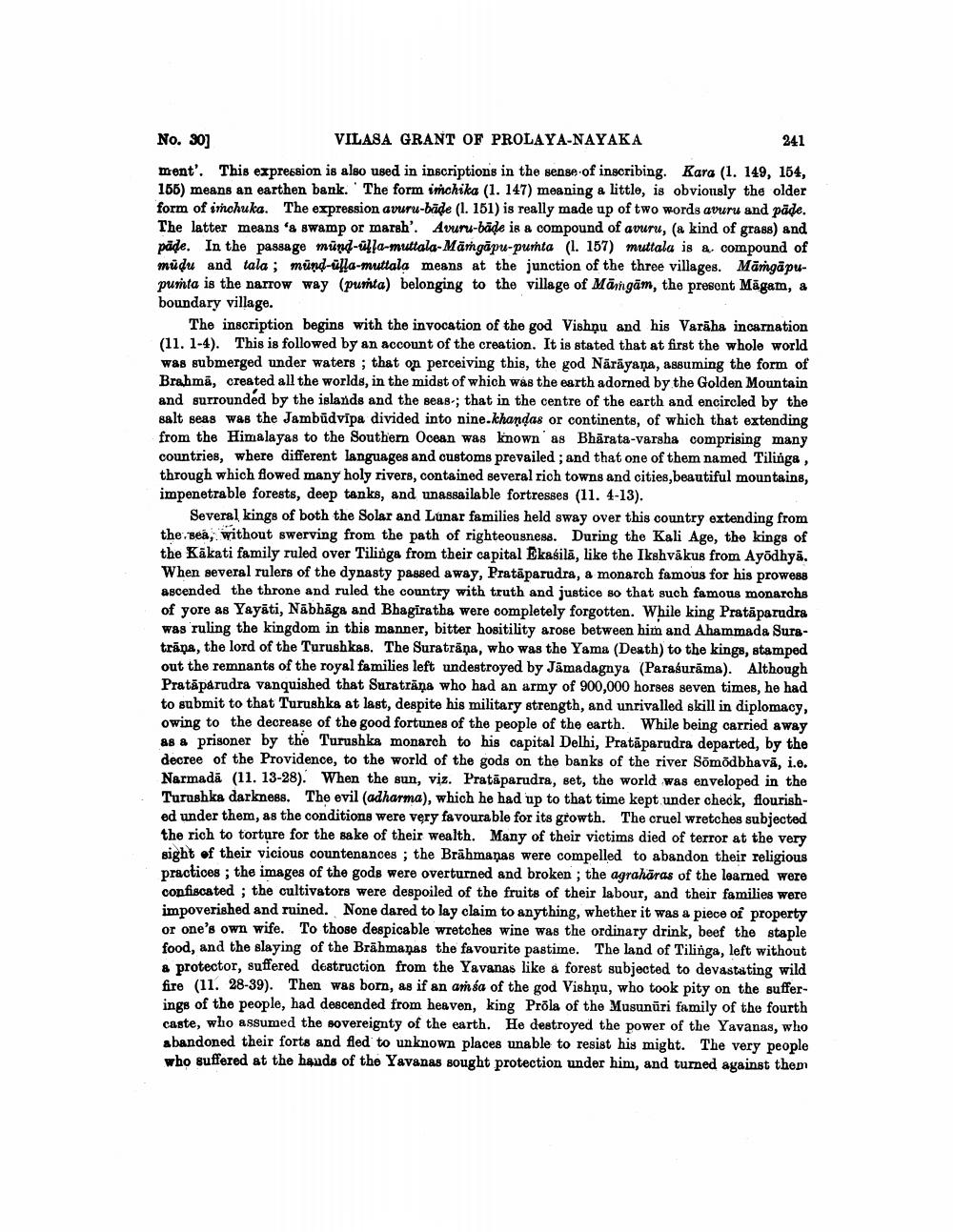________________
241
No. 30]
VILASA GRANT OF PROLAYA-NAYAKA
ment'. This expression is also used in inscriptions in the sense of inscribing. Kara (1. 149, 154, 155) means an earthen bank. The form imchika (1. 147) meaning a little, is obviously the older form of imchuka. The expression avuru-bāde (1. 151) is really made up of two words avuru and pāde. The latter means 'a swamp or marsh'. Avuru-bade is a compound of avuru, (a kind of grass) and päde. In the passage mund-ulla-muttala-Māmgāpu-pumta (1. 157) muttala is a compound of mudu and tala; mund-ülla-muttala means at the junction of the three villages. Māmgāpupunta is the narrow way (pumta) belonging to the village of Mangam, the present Magam, a boundary village.
The inscription begins with the invocation of the god Vishnu and his Varaha incarnation (11. 1-4). This is followed by an account of the creation. It is stated that at first the whole world was submerged under waters; that on perceiving this, the god Nārāyaṇa, assuming the form of Brahma, created all the worlds, in the midst of which was the earth adorned by the Golden Mountain and surrounded by the islands and the seas-; that in the centre of the earth and encircled by the salt seas was the Jambudvipa divided into nine-khandas or continents, of which that extending from the Himalayas to the Southern Ocean was known as Bharata-varsha comprising many countries, where different languages and customs prevailed; and that one of them named Tilings, through which flowed many holy rivers, contained several rich towns and cities, beautiful mountains, impenetrable forests, deep tanks, and unassailable fortresses (11. 4-13).
Several kings of both the Solar and Lunar families held sway over this country extending from the sea, without swerving from the path of righteousness. During the Kali Age, the kings of the Kakati family ruled over Tilinga from their capital Ekasila, like the Ikshvākus from Ayodhya. When several rulers of the dynasty passed away, Prataparudra, a monarch famous for his prowess ascended the throne and ruled the country with truth and justice so that such famous monarchs of yore as Yayati, Nabhāga and Bhagiratha were completely forgotten. While king Prataparudra was ruling the kingdom in this manner, bitter hositility arose between him and Ahammada Suratrapa, the lord of the Turushkas. The Suratrana, who was the Yama (Death) to the kings, stamped out the remnants of the royal families left undestroyed by Jamadagnya (Parasurama). Although Prataparudra vanquished that Suratrana who had an army of 900,000 horses seven times, he had to submit to that Turushka at last, despite his military strength, and unrivalled skill in diplomacy, owing to the decrease of the good fortunes of the people of the earth. While being carried away as a prisoner by the Turushka monarch to his capital Delhi, Prataparudra departed, by the decree of the Providence, to the world of the gods on the banks of the river Sōmōdbhavā, i.e. Narmada (11. 13-28). When the sun, viz. Prataparudra, set, the world was enveloped in the Turushka darkness. The evil (adharma), which he had up to that time kept under check, flourished under them, as the conditions were very favourable for its growth. The cruel wretches subjected the rich to torture for the sake of their wealth. Many of their victims died of terror at the very sight of their vicious countenances; the Brahmaņas were compelled to abandon their religious practices; the images of the gods were overturned and broken; the agraharas of the learned were confiscated; the cultivators were despoiled of the fruits of their labour, and their families were impoverished and ruined. None dared to lay claim to anything, whether it was a piece of property or one's own wife. To those despicable wretches wine was the ordinary drink, beef the staple food, and the slaying of the Brähmaņas the favourite pastime. The land of Tilinga, left without a protector, suffered destruction from the Yavanas like a forest subjected to devastating wild fire (11. 28-39). Then was born, as if an amsa of the god Vishnu, who took pity on the sufferings of the people, had descended from heaven, king Prōla of the Musunuri family of the fourth caste, who assumed the sovereignty of the earth. He destroyed the power of the Yavanas, who abandoned their forts and fled to unknown places unable to resist his might. The very people who suffered at the hands of the Yavanas sought protection under him, and turned against them




